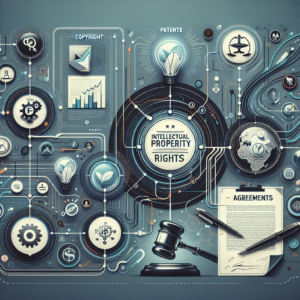Unraveling the Digital Copyright Crisis: Are Your Creations Safe?
[caption id="attachment_35116" align="alignnone" width="626"] Intellectual Property[/caption]
In an era where digital content creation is at an all-time high, the issue of copyright has become increasingly complex and contentious. As artists, writers, musicians, and other creators navigate the digital landscape, they face a myriad of challenges in protecting their intellectual property. The rise of technology has not only transformed how content is produced and shared but has also raised critical questions about ownership and rights. This article delves into the current digital copyright crisis, exploring the challenges creators face, the impact of technology, legal frameworks, the role of social media, strategies for safeguarding work, and potential reforms to address these pressing issues.
Understanding the Digital Copyright Crisis: An Overview of Current Challenges
The digital copyright crisis is characterized by a growing disconnect between traditional copyright laws and the realities of the digital age. With the proliferation of online platforms and the ease of sharing content, creators often find their work being used without permission or proper attribution. This has led to widespread concerns about the erosion of intellectual property rights, as many creators struggle to enforce their rights in a landscape where infringement can occur with a simple click. Additionally, the rapid pace of technological advancement has outstripped existing legal frameworks, leaving many creators vulnerable and uncertain about their rights and protections.
The Impact of Technology on Copyright: How Digital Tools Complicate Ownership
Technology has fundamentally altered the way content is created, distributed, and consumed, complicating the issue of copyright ownership. Digital tools enable creators to produce high-quality work with relative ease, but they also facilitate the unauthorized reproduction and distribution of that work. For instance, the rise of artificial intelligence (AI) and machine learning has introduced new challenges, as these technologies can generate content that closely resembles existing works, blurring the lines of originality and ownership. Furthermore, the ease of copying and sharing digital content has led to a culture of immediacy, where the value of original work is often diminished, and the concept of fair use is frequently misinterpreted.
Key Legal Frameworks Governing Digital Copyright: What Creators Need to Know
Navigating the legal landscape of digital copyright requires an understanding of key frameworks that govern intellectual property rights. In the United States, the Copyright Act of 1976, along with subsequent amendments, provides the foundation for copyright law, granting creators exclusive rights to their original works. However, the Digital Millennium Copyright Act (DMCA) of 1998 introduced provisions specifically addressing the challenges posed by the internet, including safe harbor protections for online service providers. Creators must also be aware of international treaties, such as the Berne Convention and the Agreement on Trade-Related Aspects of Intellectual Property Rights (TRIPS), which establish minimum standards for copyright protection across borders. Understanding these legal frameworks is crucial for creators seeking to protect their work in an increasingly globalized digital environment.
The Role of Social Media Platforms in Copyright Infringement and Protection
Social media platforms play a dual role in the digital copyright crisis, acting both as facilitators of content sharing and as potential avenues for infringement. While these platforms provide creators with unprecedented access to audiences, they also expose them to the risk of unauthorized use of their work. Many platforms have implemented copyright management tools, such as content identification systems, to help creators protect their rights. However, the effectiveness of these tools varies, and the burden often falls on creators to monitor and enforce their rights. Additionally, the terms of service of these platforms can sometimes grant them broad rights to user-generated content, further complicating the ownership landscape. As a result, creators must remain vigilant and proactive in understanding how their work is treated on these platforms.
Strategies for Creators: Safeguarding Your Work in the Digital Landscape
To navigate the complexities of digital copyright, creators can adopt several strategies to safeguard their work. First and foremost, registering their work with the U.S. Copyright Office or relevant authorities in their country provides a legal record of ownership and can enhance their ability to enforce their rights. Additionally, utilizing digital watermarks and metadata can help track and identify original works, making it easier to prove ownership in cases of infringement. Creators should also consider licensing their work under specific terms, such as Creative Commons licenses, which allow for controlled sharing while retaining certain rights. Finally, staying informed about copyright laws and emerging technologies is essential for adapting to the evolving digital landscape and protecting one’s creative output.
Future Directions: Potential Reforms to Address the Digital Copyright Dilemma
As the digital landscape continues to evolve, there is a growing call for reforms to address the challenges posed by the current copyright system. Advocates argue for a more flexible approach that balances the rights of creators with the public's interest in accessing and sharing information. Potential reforms could include updating existing copyright laws to better reflect the realities of digital content creation and distribution, as well as enhancing protections for creators against unauthorized use. Additionally, there is a push for greater transparency and accountability from social media platforms regarding their copyright policies and practices. By fostering a more equitable environment for creators, these reforms could help mitigate the digital copyright crisis and ensure that creators' rights are respected in the digital age.
The digital copyright crisis presents significant challenges for creators in an increasingly interconnected world. As technology continues to reshape the landscape of content creation and distribution, it is imperative for creators to understand their rights and the legal frameworks that govern their work. By adopting proactive strategies and advocating for necessary reforms, creators can better safeguard their intellectual property and navigate the complexities of the digital age. Ultimately, addressing the digital copyright dilemma is essential not only for protecting individual creators but also for fostering a vibrant and innovative creative ecosystem that benefits society as a whole.
